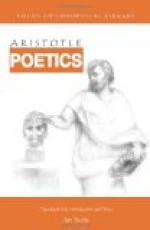Actions capable of this effect must happen between persons who are either friends or enemies or indifferent to one another. If an enemy kills an enemy, there is nothing to excite pity either in the act or the intention, —except so far as the suffering in itself is pitiful. So again with indifferent persons. But when the tragic incident occurs between those who are near or dear to one another—if, for example, a brother kills, or intends to kill, a brother, a son his father, a mother her son, a son his mother, or any other deed of the kind is done—–these are the situations to be looked for by the poet. He may not indeed destroy the framework of the received legends—the fact, for instance, that Clytemnestra was slain by Orestes and Eriphyle by Alcmaeon but he ought to show invention of his own, and skilfully handle the traditional material. Let us explain more clearly what is meant by skilful handling.
The action may be done consciously and with knowledge of the persons, in the manner of the older poets. It is thus too that Euripides makes Medea slay her children. Or, again, the deed of horror may be done, but done in ignorance, and the tie of kinship or friendship be discovered afterwards. The Oedipus of Sophocles is an example. Here, indeed, the incident is outside the drama proper; but cases occur where it falls within the action of the play: one may cite the Alcmaeon of Astydamas, or Telegonus in the Wounded Odysseus. Again, there is a third case,—to be about to act with knowledge of the persons and then not to act. The fourth case is when some one is about to do an irreparable deed through ignorance, and makes the discovery before it is done. These are the only possible ways. For the deed must either be done or not done,—and that wittingly or unwittingly. But of all these ways, to be about to act knowing the persons, and then not to act, is the worst. It is shocking without being tragic, for no disaster follows. It is, therefore, never, or very rarely, found in poetry. One instance, however, is in the Antigone, where Haemon threatens to kill Creon. The next and better way is that the deed should be perpetrated. Still better, that it should be perpetrated in ignorance, and the discovery made afterwards. There is then nothing to shock us, while the discovery produces a startling effect. The last case is the best, as when in the Cresphontes Merope is about to slay her son, but, recognising who he is, spares his life. So in the Iphigenia, the sister recognises the brother just in time. Again in the Helle, the son recognises the mother when on the point of giving her up. This, then, is why a few families only, as has been already observed, furnish the subjects of tragedy. It was not art, but happy chance, that led the poets in search of subjects to impress the tragic quality upon their plots. They are compelled, therefore, to have recourse to those houses whose history contains moving incidents like these.




